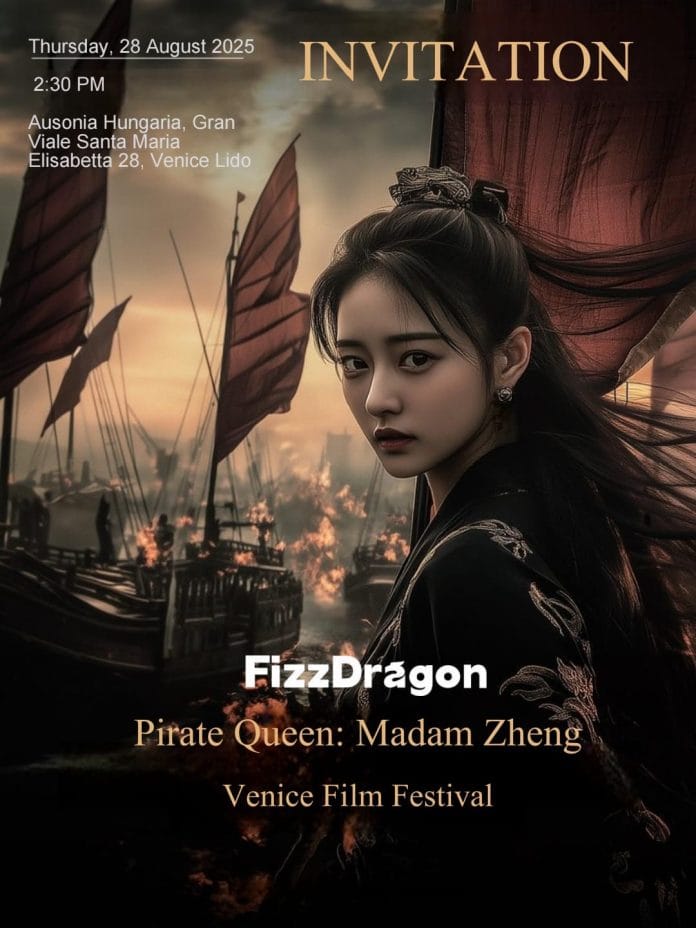During this year’s Venice Film Festival, NE Global sat down with Chen Zhuo, CEO and Founder of Singapore-based company FizzDragon.
The pioneering Artificial Intelligence Generated Content (AIGC) film production company, FizzDragon, participated in the 82nd Venice Film Festival to present at the prestigious Ausonia and Hungaria hotel, Zheng Yi Sao, the first movie to feature a fully AI-generated cast, using machine learning, computer vision, and natural language processing. The film tells the story of a woman who became a heroine in the South China Sea and was screened in cinemas across Singapore and Malaysia, receiving coverage from major news outlets like Bloomberg and Lianhe Zaobao (the largest Singaporean Chinese-language newspaper). The film was also shown during this year’s River International Film Festival in Padova. The Venice festival allowed Chen Zhuo to reflect on the content industry and engage with global creators and decision-makers, solidifying the company’s mission to innovate storytelling and showcase Chinese culture through AI-driven narratives.
NE Global: How did you come up with this story for your film?
Chen Zhuo (CZ): The film is based on the true story of a legendary Chinese woman, Zheng Yi Sao, who commanded the world’s largest pirate fleet, with over 100,000 crew members. Her life beyond piracy was equally extraordinary: orphaned as a child, she became a courtesan and later the “flower queen” of a floating brothel before being abducted by the most powerful pirate lord in the South China Sea. Yet, she refused to submit. Instead, she co-managed the pirate empire with her husband, bringing unprecedented order to its operations. After retiring from piracy, she even collaborated with the government to improve civilian welfare. Despite her significance, historical records about her are scarce due to cultural and political biases, while peripheral figures are well-documented. Like many unsung heroes across civilizations, her story deserves to be told. Using AI, we are reviving such overlooked narratives — not just for their drama, but for the timeless wisdom and inspiration they offer. For this film, we assembled a historical research team to ensure authenticity. Given AI’s evolving capabilities, we iterated the script extensively, ultimately structuring it around three perspectives: the Qing court, rival pirates, and Zheng Yi Sao herself. This approach not only highlights her uniqueness but also explores themes like maritime vs. agrarian civilizations.
NE Global: Which were the most challenging parts of this film?
CZ: When we began production in March 2024, AI’s limitations were glaring — early outputs resembled slideshow animations. We compensated with stronger music and art direction to “mask” these flaws. But as AI improved, our team at FizzDragon developed better techniques to collaborate with the tools. We codified these learnings into our platform and an open educational hub for global creators. Another hurdle was coordinating our 130+ team members across 13 countries, including veterans from Hollywood, Disney, Netflix, and CCTV, alongside passionate indie filmmakers. Time zones and workflows caused delays—a single shot might pass through artists, reviewers, colorists, and AI teams (for face/clothing swaps) across multiple countries. To streamline this, we reorganized into smaller pods of 3 – 6 people, empowering each member to multitask (e.g., a modeler learning Photoshop). This agile approach now drives most of our production.
NE Global: Because of AI, people are scared about job security. Is AI also an opportunity?
CZ: We hear these fears often, but our experience proves the opposite. Over 100 creators on our platform have already earned income by merging their creativity with AI. We’re now hiring full-time AI-assisted artists. AI democratizes filmmaking first because costs drop, freeing budgets for true artistry rather than tedious production grunt work. Second, output soars, a director can now make 10 films/year vs. one every few years. Last but not least, niche stories thrive. For example, we greenlit a sci-fi novel about depression recovery (rated 9.9/10 on Chinese literary sites but deemed “too niche” by traditional studios). Yet with 96 million depression sufferers in China (280 million globally), such stories find loyal audiences. Artists no longer need to compromise their vision to survive. AI isn’t a threat; it’s a super-tool that makes creation accessible and pure. Like smartphones replacing darkrooms, it lowers barriers, unleashing more jobs, more content, and more diversity.
NE Global: How important is it to teach this AI tool you promote?
CZ: AIGC is still in its infancy, with new tools emerging daily. We’re building an all-in-one platform to simplify production, featuring blockchain-based copyright protection; revenue-sharing models (future); collaboration hubs for creators to team up and investor matchmaking with major film funds. By consolidating tools and knowledge, we cut subscription costs and reduce legal hurdles, letting creators focus on storytelling.
NE Global: Can you tell me about the first reactions when you showed your film the first time?
CZ: Test audiences: investors, filmmakers, scientists, and cinephiles — were polarized. Some hailed it as “epoch-making,” others debated AI vs. traditional filmmaking, and many ignored technical flaws entirely, engrossed in the narrative. All recognized its significance: a proof-of-concept for distributed borderless collaboration. Like the first film or animation ever made, its imperfections couldn’t overshadow its message: The age of democratized creation is here.
NE Global: Are you collaborating with big platforms like Netflix?
CZ: Yes. We won Alibaba’s JUMPSTARTER “Best AI startup” award and were shortlisted for NVIDIA’s “Inception elite.” Beyond streaming, we are partnering with IP holders, broadcasters, and studios worldwide.
NE Global: How do you see the future of AI? Europe seems scared.
CZ: AI reshapes every industry: Large Language Models (LLMs) act as personal tutors, equalizing education; automation handles drudgery (e.g., spreadsheets, emails), boosting productivity and filmmaking becomes iterative — no more “art of compromise.” Reshoots? Cast changes? Done instantly. Yes, jobs will evolve. But as with cars replacing horse carriages, new opportunities emerge. In our ecosystem technicians build AI products (e.g., an AI therapist) and artists launch solo studios, creating ads once requiring huge teams. We call them “Super Individuals” — a focus of our training programs.
Nassim Taleb joked that the three most addictive drugs are heroin, carbs, and monthly salaries. If robots someday handle mundane labor, humans might pursue passions — preserving heritage, exploring wilderness — unshackled from paycheck survival. Of course, dystopian outcomes are possible too. But at FizzDragon, we’re focused on empowering storytellers. Soon, even a tiny village’s tales could be told, preserving cultures for future generations. That’s the legacy we’re building in AI’s early days.







